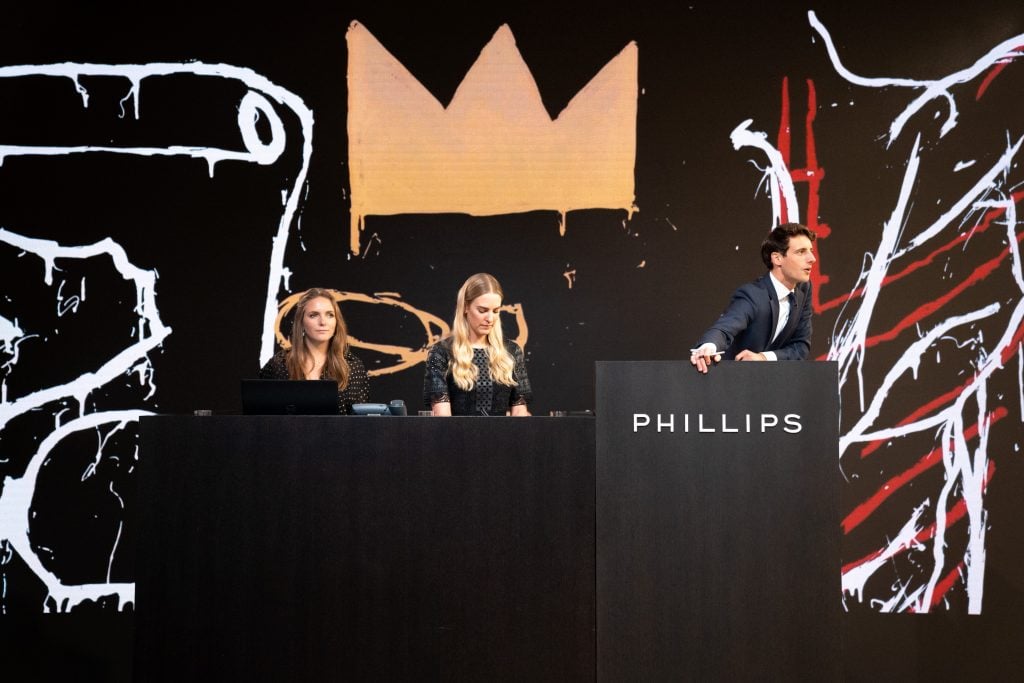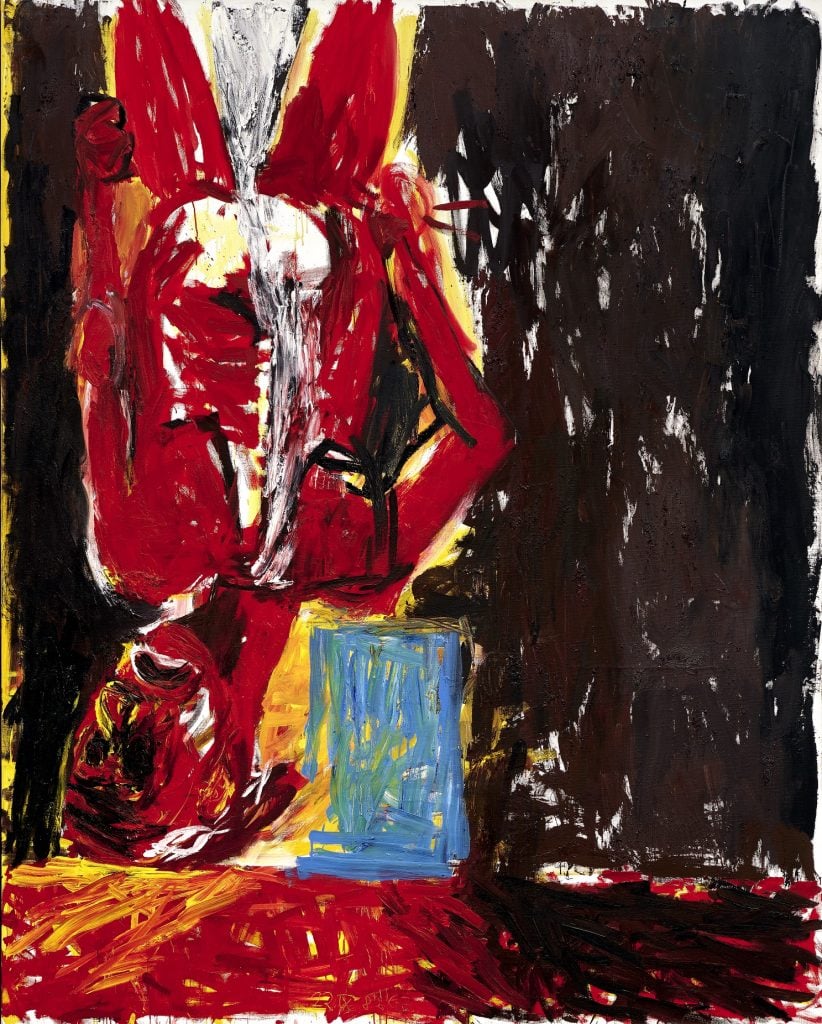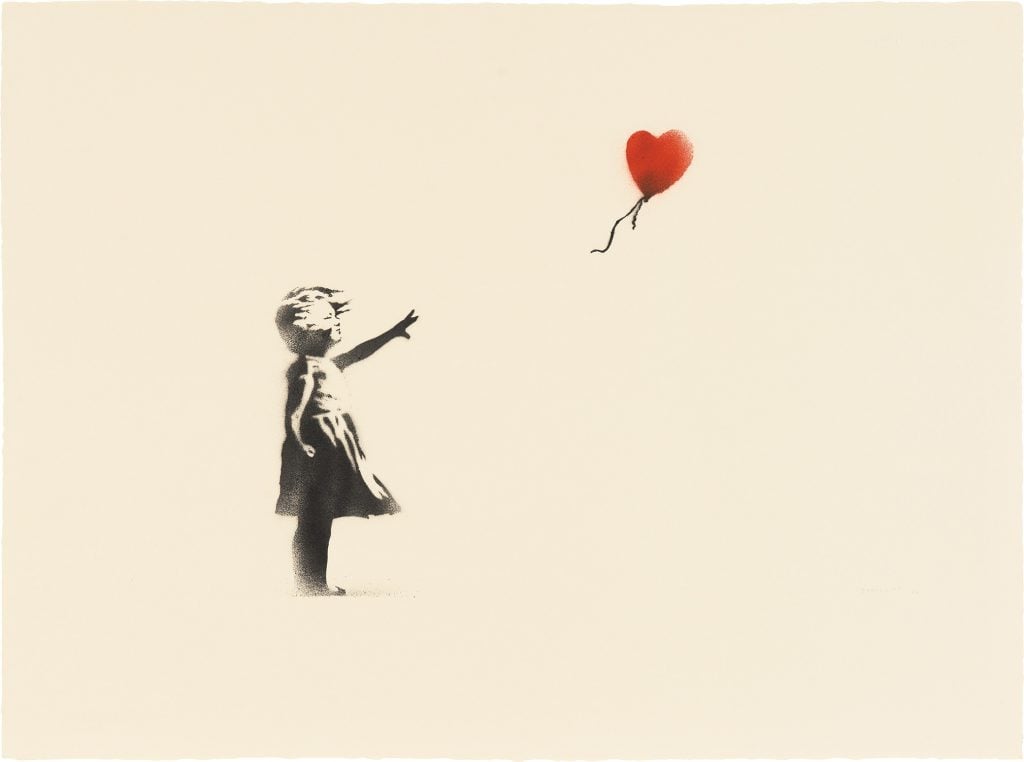Auctions
Works by Young Artists Boosted Phillips’s Solid $34 Million Sale to Kick Off the Fall Auction Season in London
The sale failed to deliver on its most expensive lot, a painting by Georg Baselitz.

The sale failed to deliver on its most expensive lot, a painting by Georg Baselitz.

Naomi Rea

Phillips’s 20th century and contemporary art evening sale kicked off a week of auctions in London today, with Sotheby’s and Christie’s to follow later in the week. The short and sweet sale totaled £26.3 million ($34.1 million) across 38 lots, falling within its pre-sale estimate of £21.7 million to £30.1 million. (Final prices include buyer’s premium, the pre-sale estimates do not.)
Phillips’s chief executive Ed Dolman was quick to dub the auction a success, noting in a post-sale press conference that the lots sold 99 percent by value and 95 percent by lot. Dolman noted the positive result was propelled in part by online bidding from Asia. “I hope it gives out a message of strength about where the market it now, and is a good harbinger for the rest of the sales this week,” Dolman said.
Even in the strained current context, the total nearly exceeds the results of the auction house’s equivalent sale last year, which brought in £25.8 million ($31.8 million) with 43 lots. This year’s total was helped fractionally by Phillips’s newly increased buyer’s premium rates, which rose by 1 percent as of October 15.
Overall, the results showed that there is continued interest in younger artists, and artists who are newer to the market, as was also evinced in the auction house’s July sale. (Technical logistics also went smoother this time around as the auction house has adjusted to the hybrid online and phone bidding environment.)
However, the sale’s seeming success was somewhat orchestrated by the auction house itself. Two lots were withdrawn, including Damien Hirst’s minimal 2005 cabinet work The Body of Christ before the sale’s start, and KAWS’s 2010 HARD FEELINGS, which was quietly withdrawn mid-sale. Twelve out of the 38 remaining lots, or 31.6 percent, were guaranteed ahead of time, including three works that were sold to benefit the Bedari Foundation: Jean-Michel Basquiat’s 1983 Back of the Neck, Keith Haring’s Untitled (Grace Jones Mask) (1987), and George Condo’s The Age of Reason (2010), which collectively went for £4.4 million with fees.

Emily Mae Smith, Alien Shores (2018). Courtesy Phillips.
Presiding over the event was auctioneer Henry Highly, who conducted the multi-camera global livestream from the London salesroom. The evening started off strong, with a flurry of bids for the first lot, Emily Mae Smith’s 2018 Alien Shores, which sold for £277,200 ($358,600), soaring past its presale high estimate of £60,000 ($77,600), with the help of 18 registered bidders. The winning bid, secured by the specialist Rosanna Widén, set a new record for the artist whose previous auction record of $187,500 was set in July at Christie’s New York, according to artnet’s Price Database.
In a post-sale press conference, the head of the auction, Kate Bryan, remarked that the interest in Smith’s work was driven partly by its aesthetic, because it fits in with the current market interest in figurative works that hark back to surrealism, as well as the lack of availability of the artist’s work on the primary market.
Smith’s painting was followed up by a work by the rising star Salman Toor, who is making his auction debut ahead of a solo exhibition at the Whitney next month. The 2012 work, Aashiana (Hearth and Home), ended up hammering at £110,000 (£138,600 with fees), more than four times its lower estimate, to an online bidder in Taiwan.
Auction records were also set for the Zimbabwean artist Portia Zvavahera, whose work sold for £163,800 ($212,000) via the specialist Svetlana Marich, and market darling Titus Kaphar, whose work sold for £466,200 ($603,000) via Nathalie Zaquin-Boulakia.

Georg Baselitz, Das letzte Selbstbildnis I (The Last Self-Portrait I) (1982). Courtesy Phillips.
Things took a turn shortly after the positive start when the sale’s top lot, Georg Baselitz’s Das letzte Selbstbildnis I from the collection of Marcel Brient, was met with a painful silence. After a drawn-out period of nearly two minutes it finally hammered at £4.1 million (£4.9 million with fees) to a singular bid from the auction house’s global chairwoman Cheyenne Westphal. The work, which did not carry a guarantee, fell short at hammer of its pre-sale low estimate of £4.7 million ($6.1 million). In the post-sale press conference, Westphal attributed the failure to a combination of an ambitious pre-sale estimate and a lack of hoped-for competition.
Then there was the matter of five lots, totaling £3.6 million, by Yoshitomo Nara, Jean-Michel Basquiat, Joan Mitchell, Georges Mathieu, and Hurvin Anderson. All hammered short of their low estimates and sold on one bid each, likely to the guarantor, which is the auction house. (Interestingly, the same paddle number also secured Keith Haring’s Grace Jones mask, which had carried a third-party guarantee that was not the auction house.)
Interest continued to lag toward the end of the sale, with another work by Baselitz and a poster painting by Albert Oehlen both hammering on their low estimates to the same bidder, likely the third-party guarantor. Then came two lots, by Jason Rhoades and Wolfgang Tillmans, that failed to sell.

Banksy, Girl with Balloon & Morons Sepia (2007). Courtesy Phillips.
If one is looking for a high point that wasn’t pre-arranged by the auction house, a version of Banksy’s popular print Girl with Balloon, from an edition of eight and including a hand spray-painted element, hammered at £1 million (£1.2 million with fees) to specialist Matt Langton, clearing its pre-sale upper estimate of £700,000.
But other anticipated successes performed underwhelmingly. Ahead of the sale there was buzz around Dana Schutz’s unflattering portrait of Donald Trump descending the Trump Tower escalators to announce his 2016 presidential bid. Expectations were high given the topical interest in the US elections, as well as news that the artist, who is currently having her first UK solo show at Thomas Dane, has recently jumped to mega-gallery David Zwirner. But the 2017 painting hammered just within estimate at £550,000 (£688,000 with fees) to specialist Svetlana Marich. There was also interest in how Lynette Yiadom-Boakye’s Luminary would do ahead of the opening of her exhibition at Tate Britain next month; it hammered on its low estimate of £250,000 (£315,000 with fees).
Overall, despite the auction house’s own positive outlook on the sale, London’s art world is probably hoping for a greater degree of organic success as the week of evening sales progresses.